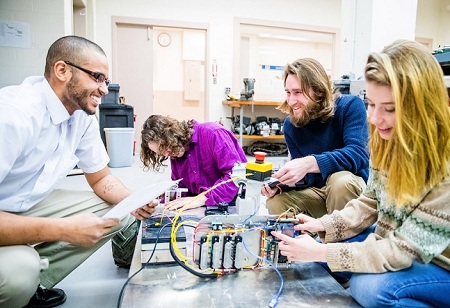-
The connection between STEM (Science, Technology, Engineering, and Mathematics) education and entrepreneurial coaching has become significant in an era of rapid technical innovation and a more competitive business climate. The approaches aspiring business innovators use for problem-solving, creativeness, and creating substantial firms have changed due to integrating STEM foundations into entrepreneurial education. This article explores the profound impact of STEM on entrepreneurial education, highlighting its role in fostering critical thought, enhancing project-centric knowledge, utilizing digital tools, resolving real-world problems, designing curriculum, and predicting future inclinations.
Integration of STEM and Entrepreneurial Education
Integrating STEM and entrepreneurship education is a dynamic synthesis beyond established limitations. By fusing the intellectual prowess of STEM with the business world's strategic insight, this novel approach aims to foster a global viewpoint. Students are given the tools to combine theoretical understanding with real-world application by integrating various disciplines. The emphasis on systematic problem-solving and evidence-based decision-making in STEM complements the risk-taking and deliberate experimentation of the entrepreneurial mentality. Through this combination, aspiring entrepreneurs develop technical domain expertise and an agile mindset that thrives in an uncertain environment. As a result, graduates become leaders in their professions who can navigate the complex obstacles presented by our changing global environment.
Enhancing Critical Thinking: STEM's Contribution to Entrepreneurial Mindset
One of the main benefits of STEM education is its focus on developing analytical and problem-solving abilities, which are crucial for any entrepreneurial endeavor. STEM education honed people's capacity to unravel complexities, decipher patterns, and develop novel solutions by immersing them in science, technology, engineering, and mathematics. These cognitive skills directly apply to entrepreneurship, as the ability to see market opportunities, develop original products or services, and develop long-term company plans depends on a strong analytical eye. Additionally, the STEM field strongly emphasizes inquiry-based learning, which nurtures a deep-seated curiosity and encourages the exploration of novel possibilities and status quo-challenging ideas. Consequently, by incorporating STEM principles into entrepreneurship education, future company leaders are given a robust toolkit for navigating the landscapes of innovation and enterprise.
Project-Based Learning: Fostering Innovation and Problem-Solving Skills
Due to the integration of STEM and entrepreneurial education, project-based learning is crucial to the educational environment. This method goes beyond simply helping students understand the material by immersing them in practical tasks that require the application of theoretical ideas to concrete, real-world problems. It acts as a productive environment for encouraging innovation and enhancing problem-solving skills. Rube Goldberg Machines, Solar-Powered Vehicles, Aquaponics Systems, Water Filtration Systems, DNA Extraction, and many more examples of project-based STEM learning activities.
Digital Tools and Platforms: Transforming Entrepreneurial Learning through STEM
Digital tools and platforms have completely changed how businesses operate and how innovators and entrepreneurs learn. By incorporating STEM principles into entrepreneurial education, we can use technology to improve learning opportunities and startup growth. Students obtain knowledge for thorough market analysis through data analytics, and digital platforms allow for quick prototyping and testing of novel ideas. This comprehensive integration of digital instruments diminishes the gap between theoretical concepts and practical implementations. It fosters the tech-savvy mindset necessary for success in the entrepreneurial sector, which relies heavily on technology. STEM-based entrepreneurial education gives aspiring business leaders the knowledge and skills they need to succeed in a constantly changing market as the digital world continues to reshape many industries.
STEM-Infused Curriculum Development for Entrepreneurship Programs
Curriculum creation for entrepreneurship that incorporates STEM ideas goes beyond individual courses. It encourages the development of complete interdisciplinary projects that combine technical expertise with business insight. Graduates who participate in such programs have an in-depth understanding of the innovation life cycle, from idea generation through commercialization. Additionally, these initiatives promote student collaborations from various backgrounds, generating a dynamic innovation ecosystem. Programs like Ethics and Technology, Incubators & Accelerators, Mentorship by Tech Experts, Hackathons, and Innovation Challenges are just a few examples.
The Future Landscape: Anticipating Trends in STEM-Driven Entrepreneurial Learning
STEM's potential to impact entrepreneurship education is positive. Integrating these technologies into entrepreneurship education becomes essential as we move towards a future where biotechnology, artificial intelligence, and renewable energy sources are crucial. This fusion will give students the technical expertise and creative insight they need to negotiate the complex terrain of future marketplaces successfully. As online learning platforms and virtual incubators advance, dismantling geographical obstacles, a notable revolution is also on the horizon. By democratizing access, a new era of STEM-driven entrepreneurial education is anticipated to emerge, creating a diverse population of forward-thinking people ready to address the opportunities and difficulties of a quickly changing world.
To sum up, combining STEM principles into entrepreneurial education represents a paradigm shift outside the norm. By combining science, technology, engineering, and math, new entrepreneurs can access a unique toolkit that combines analytical prowess, creative prowess, and technological flexibility. Thanks to these qualities, they can think of creative ideas, move quickly through uncertainty, and drive economic progress. Educators and interested parties must work together to create programmes that fully utilize STEM as it continues to shape the entrepreneurial sector. The desired result is a group of businesspeople skilled at foreseeing transformation and achieving their goals, shaping a more promising future for all parties involved.
🍪 Do you like Cookies?
We use cookies to ensure you get the best experience on our website. Read more...

